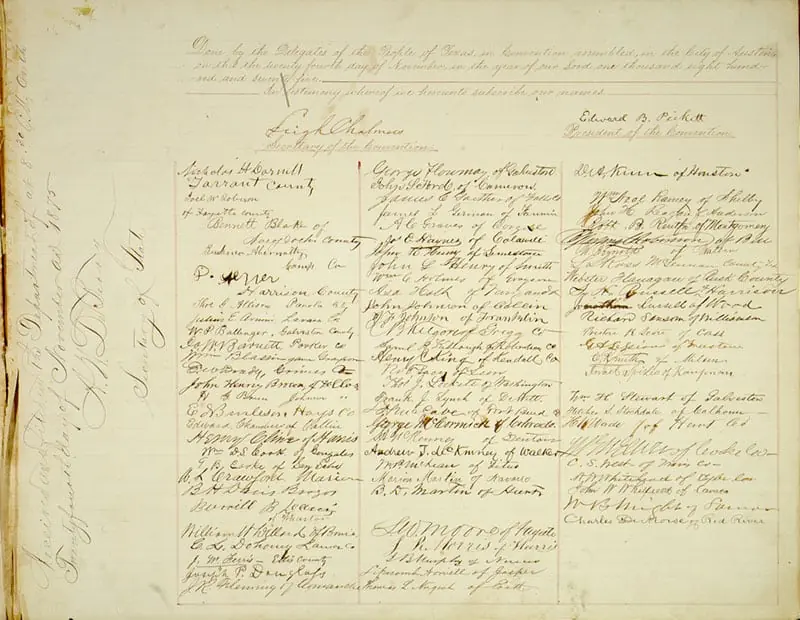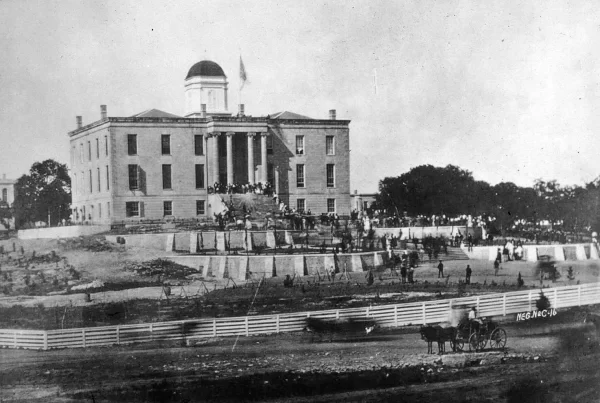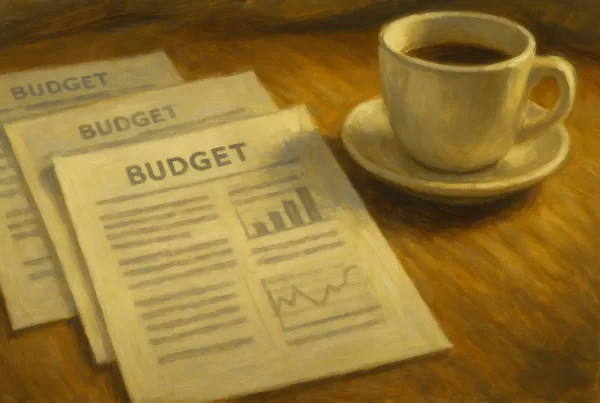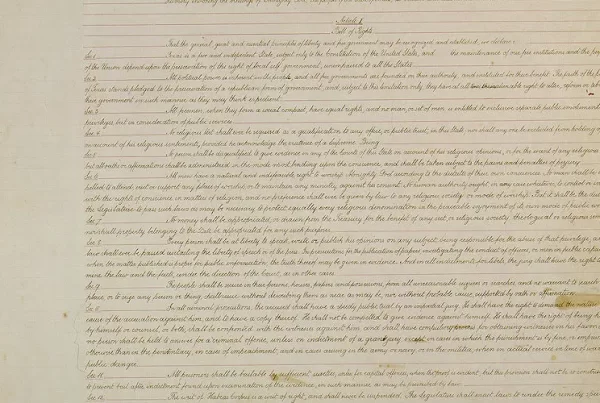Texas has a unique constitution with some odd quirks. It has been amended more than 500 times, more than almost any other state. The Texas Constitution is also the longest state constitution in the country apart from Alabama’s. Some sections of the Texas Constitution reflect outdated legal concepts or spell out rules for handling extremely unlikely scenarios. Here are just a few of the strangest provisions:
No Legislative Meddling in Place Names (Art 3, Section 56.a.3)
Texans have the right to name their own towns, ranches, roads, and children, without interference from Austin: “The Legislature shall not, except as otherwise provided in this Constitution, pass any local or special law, authorizing… changing the names of persons or places.”
No Religious Test, Except… (Art. 1, Sec. 4)
A provision of the Texas Constitution’s Bill of Rights bars atheists from holding public office. It says, “No religious test shall ever be required as a qualification to any office, or public trust, in this State; nor shall anyone be excluded from holding office on account of his religious sentiments, provided he acknowledge the existence of a Supreme Being.”
However, the provision is generally considered unenforceable because it conflicts with the U.S. Constitution. A Texas attorney general signed a federal court agreement with a Texas atheist in the 1980s, saying that the clause “is void and of no further effect in that it is in violation of the Establishment Clause of the First Amendment of the United States Constitution.”
A similar provision in the Maryland constitution was challenged in the Supreme Court in 1961 and overturned on the basis that it violated the Religious Test Clause of Article VI of the U.S. Constitution.
Keeping ’em Humble (Art. 3, Sec. 24.a.)
Members of the Texas Legislature are among the lowest paid lawmakers in the nation. They make $600 per month over a maximum period of less than five months (140 days), which is the longest allowable period of a regular session, plus a $190 for each day that the legislature is session, in order to cover the costs of staying in Austin. Legislators are forbidden from moving their place of permanent residence from the district that elected them.
Hecklers in the Legislature (Art. 3, Sec. 15)
“Each House may punish, by imprisonment, during its sessions, any person not a member, for disrespectful or disorderly conduct in its presence, or for obstructing any of its proceedings; provided, such imprisonment shall not, at any one time, exceed 48 hours.”
Managing Wildlife (Art. 1, Sec. 34.b.)
This speaks for itself: “Hunting and fishing are preferred methods of managing and controlling wildlife.”
‘In Possession of the Public Enemy’ (Art. 4, Sec. 8 )
The constitution spells out how the legislature should meet in an emergency situation when the state is under attack: “The Governor may, on extraordinary occasions, convene the Legislature… at a different place, in case that should be in possession of the public enemy or in case of the prevalence of disease threat” (Art. 4, Sec. 8).
The new location may be kept secret for security reasons: “The Governor shall notify the Lieutenant Governor and the Speaker of the House of Representatives of the place and time at which the Legislature will meet.”
“The Governor may take security precautions, consistent with the state of emergency, in determining the extent to which that information may be released” (Art 3, Sec 62c).
This section reflects Texans’ historical experience of battling the Mexican government of Antonio López de Santa Anna, who invaded Texas when the Texans declared their independence in 1836.
Wartime Quartering of Soldiers (Art. 1, Sec. 25.)
In peacetime, the state’s military forces are not allowed to live in Texans’ houses without their permission: “No soldier shall in time of peace be quartered in the house of any citizen without the consent of the owner, nor in time of war but in a manner prescribed by law.”
This provision is actually identical to the Third Amendment to the U.S. Constitution, so in that sense it’s not uniquely ‘odd’ to Texas. It derived from experiences of American Colonists with British soldiers prior to and during the American Revolution.
Limited Powers of Pardon (Art. 4, Sec. 11.b)
The Texas governor has more limited powers of pardon than either the U.S. president or governors of many other states. He may only reduce a convict’s sentence upon the recommendation of the state Board of Pardons and Paroles. That limitation was added to the constitution by amendment after Governors James “Pa” and Miriam “Ma” Ferguson famously pardoned thousands of convicted felons, generating rumors that pardons were available in exchange for cash payments. Today the governor may act independently of the Board only to stay an execution in a capital case for a period not longer than 30 days.
No For-Profit Bingo (Art. 3, Sec. 47.b)
Some provisions of the Texas Constitution reflect a uniquely Texan impulse to constitutionalize even seemingly trivial issues. For instance, all Bingo games in the state of Texas must be for charitable purposes.
The constitution states, “The Legislature by law may authorize and regulate bingo games conducted by a church, synagogue, religious society, volunteer fire department, nonprofit veterans organization, fraternal organization, or nonprofit organization supporting medical research or treatment programs.”
“A law enacted under this subsection must permit the qualified voters of any county, justice precinct, or incorporated city or town to determine… whether bingo games may be held in the county, justice precinct, or city or town.”
By contrast, the U.S. constitution and the constitutions of many other states deal mostly with structural issues and the balance of powers between the various branches of government.
Words Spoken in Debate (Art. 3, Sec. 21)
This provision of the Texas Constitution reflects a political sensibility that predates the rise of mass media: “No member [of the legislature] shall be questioned in any other place for words spoken in debate in either House.” In today’s news-saturated culture, this provision is obviously not in force. It dates to an earlier time when legislators wanted to preserve in their chambers an atmosphere of open debate free from executive coercion.



